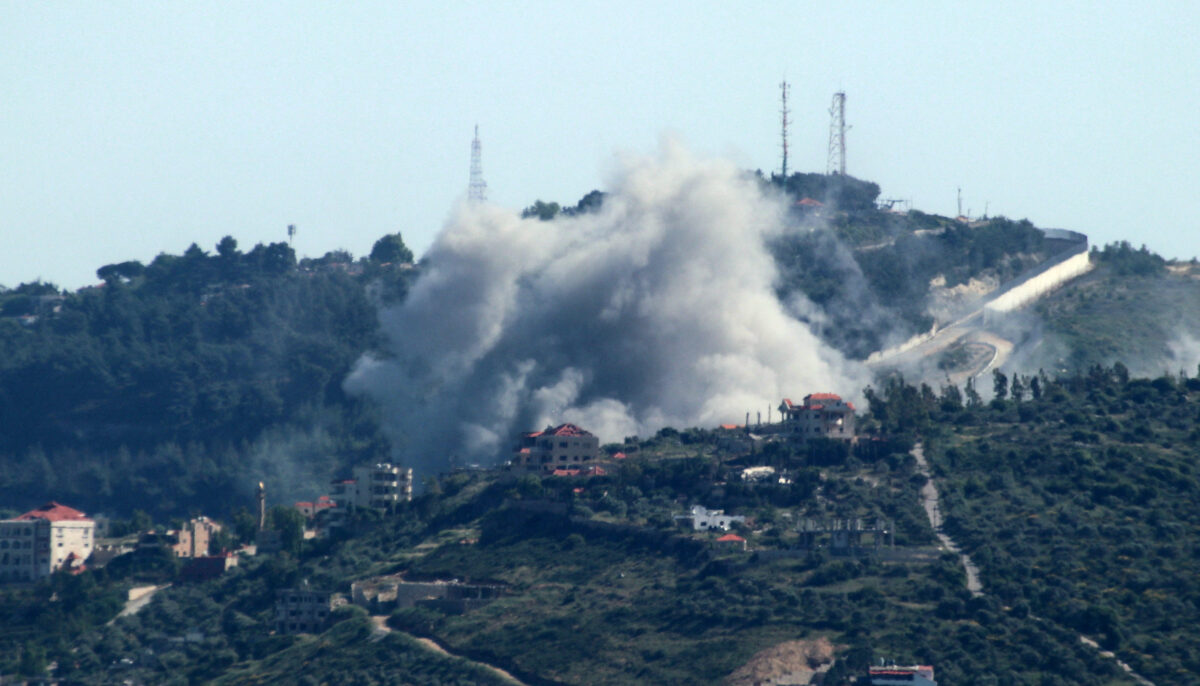After over seven months of Israeli bombardment in South Lebanon, Caretaker Minister of Communications Johnny Corm finally mandated cellular companies Alfa and Touch to provide free 20-GB internet packages for students in southern towns switching to remote learning.
Internet access has been largely restricted in Lebanon’s southern villages, exacerbating an already dire situation, where an estimated 100,000 residents have been displaced from their homes and lands.
On May 10, an Israeli airstrike targeted Ogero’s maintenance workers and Touch’s cellular provider tower in Tayr Harfa, located in the Tyre District.
Touch issued a statement confirming that the attack resulted in “the martyrdom of Youssef Jalloul, an employee of the ‘PowerTech’ company, who was performing maintenance work.”
Touch also confirmed the death of a Civil Defense volunteer, Ghaleb Hussein El-Hajj. Several others were wounded.
The Israeli strike targeted maintenance workers despite Touch coordinating with relevant authorities and obtaining necessary clearances, including from the United Nations Interim Force in Lebanon (UNIFIL), before dispatching the teams to the area.
As outlined in Touch’s statement, the purpose of the maintenance work was to carry out essential repairs in the town of Tayr Harfa.
Since October 2023, the villages in southern Lebanon, especially those bordering Israel, have become increasingly unstable due to the ongoing Israeli airstrikes.
This situation has forced students in these areas to switch to remote learning to ensure their academic year is not wasted. Implementing this decision, however, has proven to be incredibly challenging.
“We experience frequent power cuts, and even when we briefly access the internet, it’s weak and slow, making it difficult to follow classes,” says 16-year-old student Muhammad Awada to SMEX. Awada has been learning online for more than 206 days.
Awada and his family of six were displaced from the border town of Taybe in the Marjayoun District to Merouaniyeh in the Sidon District. They settled in a hotel that was abandoned in 2005 and has since served as a shelter for displaced people.
“We also resort to purchasing cellular data, costing us up to 50 US dollars per month, which is barely enough for three people, let alone six,” Awada explains.
Every day, Awada and his siblings visit a café to access the internet, paying between 3 and 5 US dollars per visit. Access to the internet is especially important as his older sister prepares for the upcoming official secondary (baccalaureate) exams.
For the past seven months, Awada and his siblings have been confined to a single room, which requires them to use headphones to stay focused.
Awada’s family is just one example of the thousands of families in southern Lebanon who were forced to abandon their homes to flee the constant bombing in their hometowns.
Outage across 20 stations
Last November, the telecommunications company Alfa issued a statement acknowledging that some Alfa stations in the towns bordering the Occupation have occasionally ceased operation due to diesel shortages, leading to interrupted services.
The statement underscored ongoing efforts to collaborate closely with relevant agencies to ensure service continuity.
Caretaker Minister of Communications Johnny Corm told SMEX that approximately 20 Alfa stations are now inactive due to maintenance issues and/or the inability to access power supply.
Corm also highlighted that some stations that provide power to other stations were completely destroyed by Israeli airstrikes.
The minister added that both telecommunication companies, Alfa and Touch, actively coordinate with the Lebanese army to conduct maintenance work whenever feasible. He attributed the primary cause of service deterioration in the south to “the significant interference across the 900 MHz bands.”
While Israel’s spy aircraft in the Lebanese airspace is not new, their frequency has increased following their attacks in the South.
Witnesses confirmed that their presence had surged significantly since last October, with up to three planes flying simultaneously over the southern skies along the military aircraft that bomb villages.
“One time, we were in school, and the teacher was in the middle of explaining a lesson when Israeli warplanes suddenly conducted a raid nearby,” recounted Awada.
“Not long ago, Israeli planes broke the sound barrier over Merouaniyeh. We could no longer focus because of how scared we were.”
The communications crisis has impacted not only the South of Lebanon but the entire country. Caretaker Minister Corm explained to SMEX that technical difficulties hindered authorities from properly restarting transmission stations.
Lebanon’s communications sector was struggling even before the Israeli war in the south. For decades, the sector has grappled with issues like poor network quality, limited services, and high prices.
These challenges have lasted since the Lebanese War (1975-1990), through the economic crisis in 2019, and continue today during the Israeli aggression on Lebanon.
No remote work without internet and electricity
For residents in the south, like millions everywhere, remote work became prevalent following the outbreak of the COVID-19 pandemic.
However, residents all across Lebanon face significant challenges regarding the speed and quality of internet services, which are frequently unavailable.
Nahla al-Amin, a young woman residing in the border town of Shaqra in the Bint Jbeil district, experiences these difficulties firsthand. The outskirts of Shaqra are often hit by Israeli bombings.
Al-Amin, who is a graphic designer at a local company, heavily relies on consistent internet access and electricity for her work.
“My work needs uninterrupted internet connectivity and electricity, especially considering I frequently need to communicate with clients for designs,” says Al Amin. “I used to go to my friends’ places to access the internet, but I no longer feel comfortable doing it, and it’s not a sustainable option for me.”
After facing many challenges and trying to find ways to cope with them, Al-Amin resigned from her job because of the internet cuts in her region. The crisis directly influenced her ability to consistently deliver projects on time and stick to her working hours.
In response to reports highlighting the ongoing disruption to communication lines, the Minister of Communications, Johnny Corm, told SMEX these concerns were addressed.
He affirmed that Ogero’s land wire lines remain completely isolated and unaffected by interference attempts. But he also acknowledged that weak signal could impact wireless communications used by service providers to connect customers, wirelessly or through cell towers.
As a temporary measure, Alfa and Touch have implemented local voice services in many areas and have taken proactive measures to address any signal interference across their networks, as stated by Corm.
The Ministry of Communications’ inadequate efforts to resolve signal issues
On October 26, 2023, the Minister of Communications announced a contingency plan, as outlined in a radio statement jointly proposed by Ogero, Alfa, and Touch.
This plan aimed to address challenges that could arise from a potential large-scale war in Lebanon. Among its provisions were using mobile generators, ensuring a full diesel stock, safeguarding data, establishing a remote network control room, ensuring the availability of mobile charging cards in the market, and implementing round-the-clock security measures to mitigate electronic breaches.
But Lebanese citizens, particularly those residing in areas with humanitarian conditions and internet outages, remain uncertain about the current progress of this plan and its implementation.
In response to this uncertainty, Abed Kataya, Digital Content Manager at SMEX, questions the outcomes of this plan: “The steps taken by the ministry were random and chaotic. What has actually been implemented? And why is there no discussion about it now?”
The internet package tailored for students in southern villages is constrained to just one application for distance learning. Kataya believes that this limitation is inadequate, emphasizing that students require access to a variety of applications for studying, communication, and staying connected with family and relatives.
Concerning Ogero, Corm confirms that plans have been devised to reroute the wires wherever feasible and within available capacities in case Israel strikes main centers.
The Ministry of Communications formed an emergency group involving Touch and Alfa to address the “current security crisis in the South.” The ministry stressed that the critical issues facing the telecommunications sector require collaboration among these multiple parties.
This initiative entails daily coordination between the two cellular companies to activate the national roaming service, thereby extending coverage to subscribers in areas experiencing network outages, Corm told SMEX.
The Lebanese Minister of Communications affirms the commitment of both Alfa and Touch providers to exchange resources regarding potential interference with the country’s communications network.
This mechanism is similar to the approach taken during the assessment of interference with the Global Positioning System (GPS). Surprisingly, Corm notes that the ministry has yet to observe any impact on the internet.
SMEX had documented Israeli jamming targeting the GPS in Lebanon, posing risks to civilian air and maritime traffic.
The Israeli Occupation employs specialized technologies to disrupt GPS signals and communications as part of its military strategy. The Israeli News Agency (Ynet) also reported in December that the methods used by Israel affect signals in the occupied Palestinian territories and neighboring countries, including Lebanon.
The Israeli war on southern Lebanon represents the hardest and most violent episode in a series of successive crises afflicting the country. These crises are exacerbated by evident negligence from official bodies in many areas that hinder the implementation of urgent reforms, particularly in the communications sector.



